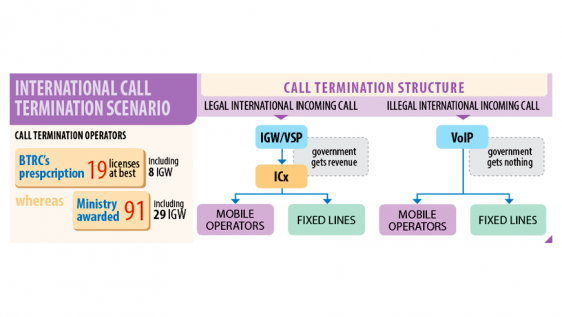A market that can accommodate only 19 call termination operators, now has 91
Lack of foresight from the authority, corruption by officials and a section of politicians and a mad rush of businessmen have contributed to the near collapse of the call termination market that had the potential to be a major foreign currency earning sector for the country.
Until March 2012, there were only nine call termination service operators in Bangladesh – four internet gateways (IGW), two interconnection exchanges (ICx) and two international internet gateways (IIG).
According to telecom watchdog BTRC, 19 operators at best can survive profitably in the market. It recommended that the government could award only four more IGW, four ICx and two IIG licences.
But the government never heeded that; instead it awarded 82 more licences in 2012, taking the number of IGWs to 29, ICxs to 23 and IIGs to 39. The total number of call termination operators stood at 91. Many of those were given on political considerations, rendering the market over-saturated and making it nearly impossible to earn a profit.
When the government amended the regulations and started giving new licences in 2010, many businessmen wanted to make some real profit from the market which was worth nearly Tk2,000 crore. Some politicians, mainly ministers and ruling party lawmakers, started flexing their muscles to get IGW licences.
There was another group of “middlemen” – mainly politicians – who saw this as an opportunity to make crores without investing a penny. They took bribes from applicants in return for getting them licences by using their political influences.
In the process, some government officials also fattened their pockets by playing ball with these middlemen politicians.
The Dhaka Tribune has learned that for some of the licences, there had been underhanded dealings worth Tk2-4 crore.
Because of the overcrowded market, the government and the Bangladesh Telecommunication Regulatory Commission (BTRC) have virtually lost control.
Meanwhile, taking advantage of the market’s volatility, several IGW operators have initiated a process of creating a consortium to control all the incoming and outgoing international voice call terminations, in what others say is an attempt to monopolise the market.
In layman’s terms, for international calls to reach a land line or mobile phone in Bangladesh, they have to be passed or routed through what are known as “gateways.”
When an international call is legally routed through a licensed international gateway (IGW), the Bangladesh government gets a duty from the IGW operator. The telecom operator in the foreign country shares a certain amount of the money – which it charges its subscriber for the international call – with the IGW operator in Bangladesh.
In 2010, there were only four licensed IGW operators in the market who shared Tk1,530 crore of their revenue with the government. By 2013, there were as many as 29 IGW operators who shared Tk1,627 crore with the government.
Analysts say if the market was less saturated and the operators could make better profits, they would have been able to share much more with the government.
However, the current scenario of the market is that most of the operators are finding it hard to make any profit because of the excessive number of competitors. In fact, many have pulled out of the business after having failed to make any substantial profit against the huge investment they had made for call termination infrastructure.
There are also operators who never ended up entering the market altogether after getting licensed because of the tight situation.
Zahir Ahmed, managing director and CEO of Bangla Tel, told the Dhaka Tribune that he used to work for licenced IGW Mir Telecom in 2008. In 2010, after the regulations were amended and the government started giving new licences, he joined IGW licencee Bangla Tel.
“We did all the calculations before starting our venture as to what might happen if there were too many operators. But we got the actual picture after starting our business. Only then did we realise how bad the situation was,” he said.
He also said if everything had been done following rules, the situation would not have become so alarming.
Role of officials
Current BTRC Chairman Sunil Kanti Bose was the secretary of the Telecommunication Ministry when the decision was made to award more IGW licences in 2010.
At that time, Sunil reportedly played a key role in spearheading the ministry’s decision to award licences on a wholesale basis ignoring the then BTRC’s recommendations.
Even the Parliamentary Standing Committee on the Telecommunication Ministry lobbied for more licences, according to the minutes of the 35th meeting of that committee.
When this Dhaka Tribune correspondent tried to contact him in connection with this particular report, Sunil refused to make any comment. However, on a previous occasion, he told the Dhaka Tribune: “Increasing the number of licenses was a political decision…. The decision to give licences was not made by the secretary, the minster made the call.”
He also said: “Who can say for certain how many licences are right? Only the market can ascertain this.”
Sources said the then telecommunication minister Rajiuddin Ahmed Raju, the then parliamentary standing committee chairman and Sunil Kanti Bose had met Prime Minister Sheikh Hasina at that time to convince her about giving out more IGW licences.
Former BTRC chairman Maj Gen (retd) Manzurul Alam told the Dhaka Tribune: “Awarding so many licences was unexpected. The market is not big enough to sustainably accommodate 29 IGWs. This overcrowded situation has created an unhealthy competition. As a result, the regulator has lost control over the market and the government is losing revenue.”
Former BTRC consultant Rezaul Kadir told the Dhaka Tribune: “We have said more than eight licenses cannot survive in the IGW sector. We also tried to convince them [the ministry] with statistics, but they did not listen to us.”
Political influences
Documents show that one of the licences was given to Selima Osman, Imtiaz Osman and Tanvir Ahmed, wife, son and brother-in-law, respectively, of Shamim Osman, the controversial ruling party lawmaker from Narayanganj. Just before the January 5 election in which he was elected MP, the ownership of K Telecom was changed and the names of his family members were removed from the list of company shareholders. At that time, K Telecom owed Tk90 crore to the government in the form of revenue sharing.
Ratul Telecom’s licence application carried a recommendation from Jahangir Kabir Nanak, former LGRD minister. At that time, the company had no shareholder from Nanak’s family. However, a few months later, the name of Nanak’s wife Syeda Anjuman Banu appeared in the list of directors and daughter Syeda Amrin in the list of partners.
Former health minister AFM Ruhal Haque’s son Ziaul Haque was the director of Moss-5 Tel and his wife Ila Haque was one of the partners.
Former state minister for home Shamsul Haque Tuku’s son SM Shams was a director of Vision Tel. Last year, however, he dissolved his stake in the company. Same with former communications minister Abul Hossain’s daughter who also owned a similar company. She, however, dissolved her stake in December 2012.
There are allegations that an influential lawmaker from Dhaka who is a lawyer by profession, helped several businessmen get licences in exchange for amounts ranging from Tk3-4 crore.
Prime Minister’s Special Assistant Abdus Sobhan Mia’s wife Gulshan Ara Mia got an IGW licence for her company Roots Communications.
Mir Nasir Hossain, president of the Telecommunication Infrastructure Operators of Bangladesh and also managing director of IGW operator Mir Telecom, told the Dhaka Tribune: “As this is an over-licensed market, there is no discipline here. My assumption is that in the near future, no IGW operator will be able to survive. We are very frustrated.”
Call termination structure
Legally, international calls can enter Bangladesh in two ways – through an IGW or through any of the VoIP service providers (VSPs). The international internet gateways (IIGs) are organisational call termination licences that work on the basis of VoIP while the VSPs are mainly individual operators.
The IGW operators and the IIG or VSPs have contracts with foreign carriers. On the basis of those contracts, certain IGW and IIG or VSPs receive calls from certain foreign carriers. This is more of a matter of marketing – the more foreign carriers that a local company has contracts with, the better its business is.
When an intentional call enters Bangladesh, the foreign carrier has to pay the $0.03 for each minute of call termination to the IGW or the VSP. The IGW or the VSP then forwards the call to an interconnection exchange (ICX), which then forwards the call to the network of the operator of the destination number.
This $0.03 is shared between the IGW or the VSP, the ICX, the local telecom operator and the government. This is known as revenue sharing.
However, when international calls enter through illegal voice over internet protocol (VoIP) operators, the foreign telecom operators have to pay much less. Since there is no involvement of an ICX in case of an illegal call, the government cannot keep any track and hence loses out on earning revenue.
Illegal VoIP calls have always been a headache for the regulator and also the government.
Available data suggests that illegal VoIP operators terminate at least four crore minutes of calls every day.
Professionals have suggested that if the government could cut down the IGW call termination rates further, illegal VoIP calls would not be as cheap any more and people would opt out of making illegal calls.
In that way, the licensed operators would be able to handle millions of more minutes and thus be compensated for the curtailed price.
Seeking anonymity, the owner of an IGW operator said: “The six crore minutes of legal calls can be handled with only five to seven additional IGWs; but here we turned the sector into a jungle of equipment… We have already spent several hundred crores of taka to import unnecessary equipment. It has been a total waste.”
Industry insiders said to become an IGW operator, some would have to invest around Tk24-26 crore, including Tk15 crore for a licence.
Source: Dhaka Tribune










